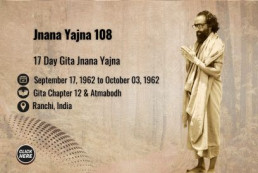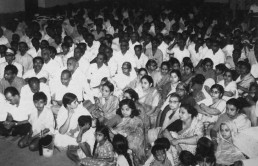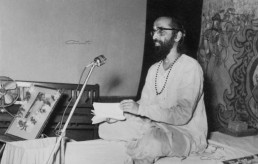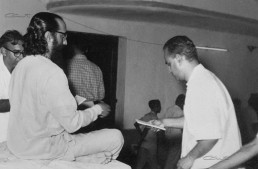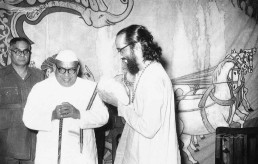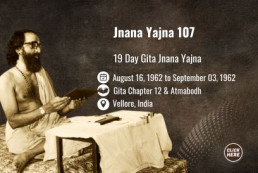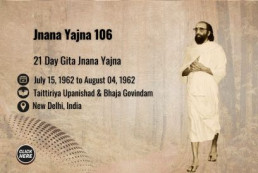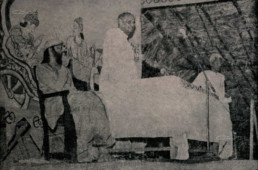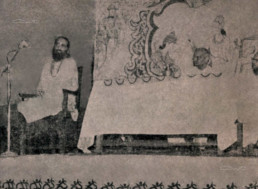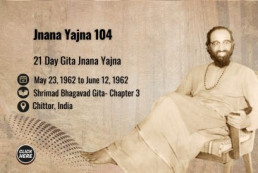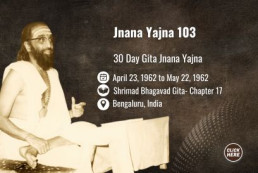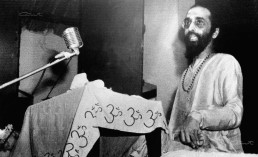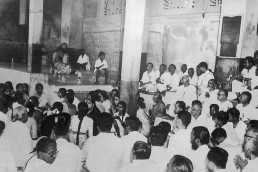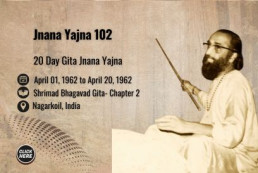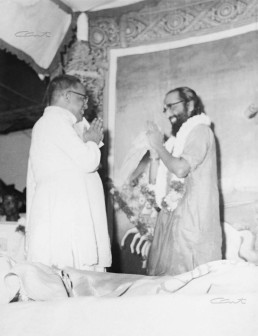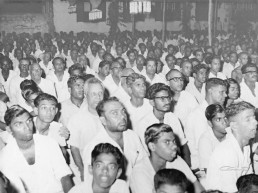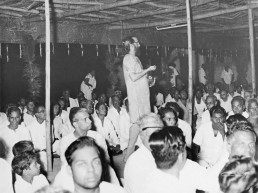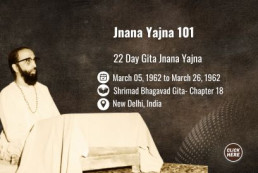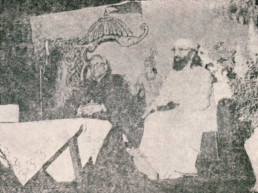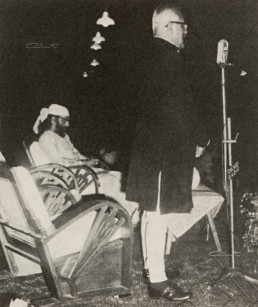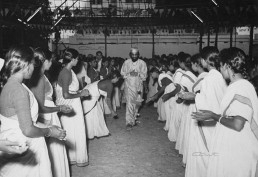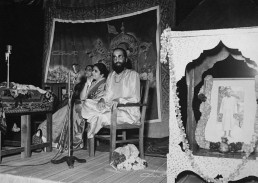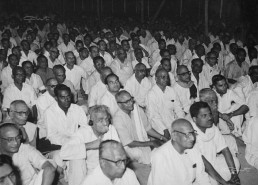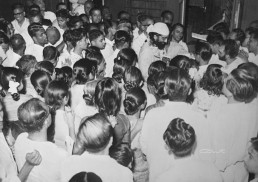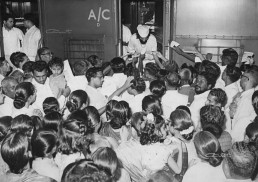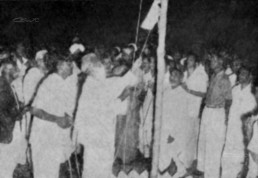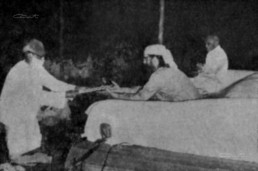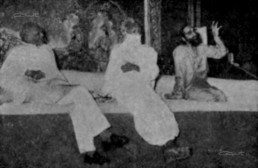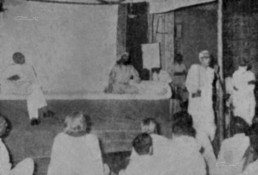Jnana Yajna 108
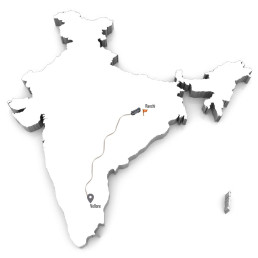
Jnana Yajna 108

Year & Dates:
September 17, 1962 to October 03, 1962

Yajna Topic:
Shrimad Bhagavad Gita- Chapter 12 & Atmabodh

Place:
Ranchi, India
Auspiciousness marked the opening day of Pujya Gurudev’s 108th Jnana Yajna in Ranchi on September 17,1962. The enthusiastic group of young aspirants of the Heavy Engineering Corporation Colony, who had energetically organized the yajna, stood glowing as Pujya Gurudev made a majestic entrance into the yajnashala at the “Satsang Bhavan” in the capital of the Jharkhand state. Dr. A Nagaraja Rao, the President of the Heavy Engineering Corporation welcomed Pujya Gurudev as the gathering waited with bated breath. Then, Shri Ananthasayanam Ayyangar, then the Governor of Bihar, inaugurated the yajna expressing how he felt fortunate to get a second opportunity to inaugurate another yajna of Pujya Gurudev’s. The Jnana yajnas were “bringing the masses in touch with our hoary scriptural texts,” praised the Governor. Speaking about the significance of the Gita, he remarked, “Don’t be under the impression that it is all meant only for the sannyasins; a sannyasin is already an evolved person. The Gita is addressed to us.”
Toward Perfection- Self and the World
For Pujya Gurudev, the 108th Jnana Yajna was no different nor more significant than the first in which He had roared the message of the Upanishads. From where He functioned, the unconditional giving of Knowledge alone mattered. Commencing the yajna, He stated firmly:
“For the revival of the grand old spiritual harmony of the land, a bold enquiry into the past and into our scriptures – in a spirit of research and scholarship, and not in blind faith is very essential.” He referred to the “wide gorge” between generations. While the older generations lived by the injunctions of the prophets and sages, the new generations often did not feel there was anything worthwhile in the ancient scriptures. However, Pujya Gurudev was optimistic about the awakening among the educated youth who were re-examining Vedanta. With conviction, He invited the youth in the audience to continue their analysis, asserting, “No other scripture in the world can face the ruthless attack of logic and reasoning as was available in the Vedantic Scriptures. Their logic is so tight and complete that many of our misconceptions will be removed once we begin to go through them.”
“Our prejudices and misconceptions about our scriptures have made everyone of us a spiritual zero; and the community comprising such individuals cannot be anything better than that. It is therefore essential that individuals should better themselves. The message of the Rshis is – world perfection through individual perfection.”
The young and the old of Ranchi assembled in large numbers to listen, reflect, and absorb. During that 16-day yajna, Pujya Gurudev recreated the introspective atmosphere of Kenopanishad during His morning discourses at the School Hall of the Dhurwa Colony. The evenings devoted to Bhakti Yoga (chapter 12) made the audience rise in love for the Divine.
The 108th Jnana Yajna of Pujya Gurudev was just the beginning. Those formative years of Chinmaya Mission sowed the seeds of everything divine in millions of lives who began their quest and saadhana. In the years that followed, through all His 532 Jnana Yajnas, He infused the yearning – His lofty love made every seeker strive to be a Mumukshu, desiring Liberation. He guided all toward Viveka – the relentless enquiry into the real, Vairaagya – the joy of dispassion, and the sixfold wealth, Shat Sampatti, of spiritual values and discipline. Through every yajna, He lit the path of self-unfoldment through Shravana and Manana to gain the bliss of Nididhyaasana.
Flowing down from Uttarkashi with grace and pure Knowledge, Pujya Gurudev Swami Chinmayananda initiated a pilgrimage that started with those momentous first 108 yajnas and still continues…
A Meditation Minute:
कृतज्ञता या च हृदि स्थिता मे वक्तुं न शक्या खलु यत्नतोऽपि ।
गुरो प्रसीद कृपया विधेहि त्वत्पादभक्तिं परमानुरक्तिम् ॥११॥
kṛtajñatā yā ca hṛdi sthitā me vaktuṃ na śakyā khalu yatnato’pi ।
guro prasīda kṛpayā vidhehi tvatpādabhaktiṃ paramānuraktim ॥11॥
- The gratitude in my heart can never be expressed fully in spite of my best efforts. O Teacher ! Be gracious and bless me with devotion, of the nature of Supreme love to your feet.
Let us seek the Grace and blessings of Pujya Gurudev, as we walk the Chinmaya path to live devoted to what He taught tirelessly. Words dissolve into silence as we try to express our endless gratitude and reverent love for the Yuga-purusha, our beloved Pujya Gurudev Swami Chinmayananda. At His Feet, we offer our all. Hari Om!
Photo Gallery
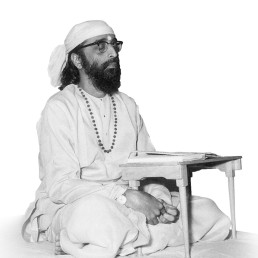
“Think,” Says Pujya Gurudev
It is the ego (Jeeva) that brings an individual again and again to bondage, and it is the ego again that keeps him bound to the world of ignorance. When the duality is removed, when even the thought “I am the Brahman” is dissolved in the all-consuming Knowledge of the Self, there remains but one all absorbing experience of the One Supreme Self, Eternal, Infinite. This subjective experience alone is the final culmination of all spiritual seeking because the Self is not an object of cognition. It is the very Light which illumines all our experiences.
So by constant “Jnana-Abhyasa” we have to eliminate all the Vasanas, end the mind and come to experience that Self which is our real essential nature. Just as the medicine we take of its own accord gets ultimately eliminated from us, so too the experience “I am Brahman” is also dissolved in that spiritual glow.
From Atmabodh Book
“Those who worship Me, renouncing all actions in Me”.
To renounce all our actions to an Institution, to an idea or to a power is to end our individual limitations and identify ourselves with it. Thus an ordinary man, as ambassador of a country, becomes a mighty personality in the foreign courts, because he talks, acts, thinks and expresses the will of an entire people. Similarly, one, as a devotee of the Infinite Lord, when one has learnt the art of surrendering oneself totally at the feet of the Lord and acts as a messenger or a representative of the Will of the Lord, one becomes, not only divinely ‘dynamic’, but in and through one’s own activities one becomes constantly aware of the presence and grace of the Universal Spirit.
“Regarding Me as the Supreme Goal”:- a dancer never forgets the rhythm of the drum to which she is to step on. A musician is ever conscious of the background hum. Similarly a devotee is advised here not to take up religion as part-time entertainment or a temporary escapism but to consider the Lord as the Supreme Goal to be achieved in and through life. In short, we are advised that in order to ascend to the higher summits of our cultural perfection it is necessary that we direct all our contacts, transactions, experiences in our life towards the achievement of this cumulative goal of Self-Perfection as symbolized in the Lord of our heart.
From Tyagi Magazine
The Secret to know God!
Just as one doesn’t need another light to see a lit lamp, one’s own consciousness is sufficient to perceive the Self. No external instruments are necessary to know the nature of consciousness, as it illuminates all experiences without the need for additional perception tools.
Jnana Yajna 107

Jnana Yajna 107

Year & Dates:
August 16, 1962 to September 09, 1962

Yajna Topic:
Shrimad Bhagavad Gita- Chapter 12 & Atmabodh

Place:
Vellore, India
With the impressive ramparts of its well-known fort built in 16th century, its Jalakandeshwara Shiva temple and other ancient places of worship, Vellore in Tamil Nadu has a history of courage and devotion. Opening its heart to Pujya Gurudev on His first Jnana Yajna in that town, the welcome address eulogized: “That you have conducted up to now 106 Yagnas so successfully in many parts of the country is a sure indication that your movement is divinely inspired and that the people are receptive to your teaching. With your profound learning, marvelous eloquence, singular powers of elucidation with apt illustrations, you have been able to bring home to the people the eternal truths enshrined in our ancient scriptures. You are at once seer and sage, preceptor and preacher, philosopher and prophet; and, you were impelled by a fiery zeal to make the things of the Spirit assume the primary place in man’s life.”
A Chinmaya Dawn of Devotion
The welcome address echoed the thoughts of those who heeded the call for spiritual revival; mere material progress forsaking a heritage that held the secret to lasting happiness could only be a shortsighted rush. By 1962, the “Chinmaya Era” had begun. Pujya Gurudev’s travels and talks across many forums were increasing rapidly as evident from His dizzying itinerary. The people of Vellore acknowledged and appreciated Pujya Gurudev’s march forward; in a spiritual vein with a military touch, they declared, “We do require a guide to lead us along the true path of advancement towards the goal of true knowledge and happiness. Your grand idea of establishing a University for the training of dedicated men to the service of the country, to which you have set your hand, is a glorious enterprise; and, the Lord is surely behind it.”
In that 107th Jnana Yajna, Pujya Gurudev established the importance of Self-Knowledge through His discourses on Atma Bodha. He also evoked the purifying power of devotion voicing and explaining the divine verses of chapter 12 – Bhakti Yoga.
By the 107th Jnana Yajna, Pujya Gurudev had gradually and gracefully inculcated all the nine modes of devotion in His Jnana Yajnas and in the spiritual psyche of Chinmaya Mission. It began with Vedantic Shravanam that awakened the quest in thousands and more across the land. The Akhanda Kirtanam in the yajnas and Smaranam in the expanding Chinmaya Study Groups strengthened the path.Carrying out the mission as worship of His Guru, Pujya Gurudev modeled Pada Sevanam, the spirit of seva. Archanam, the exquisite beauty of worship, melted hearts during the Laksharchanas where He made people recall the joy of Bhakti. The many Guru Dakshina ceremonies with salutations to the Guru Parampara unveiled Vandanam with the heartfelt joy of gratitude. The way Pujya Gurudev called Himself the chief sevak, like the greatest devotee, Sri Hanuman, made seekers understand the importance of Daasyam, the uplifting attitude of servitude. In His Gita Jnana Yajnas, Pujya Gurudev personified Sakhyam, the only lasting friendship with Bhagavan. Finally, dexterously weaving into every mode of devotion, the understanding of the Highest, Pujya Gurudev invoked the joy of Atma Nivedanam, the complete surrender of the finite to the Infinite. Bhakti and Jnana embedded in selfless karma became the divine edict of Chinmaya Mission.
A Meditation Minute:
अनेकजन्मार्जितपुण्यप्राप्तः मया गुरुर्नो जगति प्रसिद्धः ।
यस्य प्रसादेन मनः प्रशान्तं बभूव मे तं शिरसा नमामि ॥१०॥
anekajanmārjitapuṇyaprāptaḥ mayā gururno jagati prasiddhaḥ ।
yasya prasādena manaḥ praśāntaṃ babhūva me taṃ śirasā namāmi ॥10॥
- I found the world-famous Guru due to merits acquired in my previous countless lives (births / life times). I bow down to him by whose grace my mind has attained peace.
We are deeply grateful for the Grace that descended on us in the form of Pujya Gurudev. Seekers and devotees still search their hearts wondering if they have ever deserved the immeasurable blessing of Pujya Gurudev’s Presence in their lives. His Causeless Compassion wherever He went, transforming lives, remains crystallized in Chinmaya Mission.

“Think,” Says Pujya Gurudev
“Anya” means ‘other’; “Ananya” means ‘without otherness’; Krishna is advising here Ananya Yoga meaning a Yoga in which the goal is ever steady and our mind has no “otherness” about it.
It may be noted here that the mental disintegration can come both because of the otherness in our goal or because of the mind wandering into other channels of pre-occupations.
Thus those (a) who have renounced all actions in Me (b) who regard Me as the Supreme goal and (c) who with a single-pointed mind and goal strive, are the best of my devotees, when their strife is constituted of meditation (Dhyana) and worship (Upasana). We have already indicated that Upasana is not merely meditation upon a goal but an active becoming one with the goal contemplated upon.
Enumerating thus the conditions necessary for a devotee at his seat of meditation, Krishna assures him that he need not wonder how he will go beyond the shores of sorrow, agitation and imperfections, which are the lot of all mortals. “I shall be their savior” is a divine commandment, a Godly assurance and an infinite guarantee.
From Tyagi Magazine
Light is necessary to see the furniture in the dark room of a house, but to see the very light which illuminates the furniture do we require any other light?
We do not call for the aid of any other light to see the very sun that illuminates all the objects in the world, because the sun itself is illumination complete. To understand, realize and experience the self, the Illuminating light in all our experience, in fact, in all beings at all times, no other “light” is necessary, because this self alone is the Real, and this Self alone lights up the knowledge of the entire creation known and unknown. This Self is the all-awaring Consciousness Absolute.
From Atma Bodha
Cause of Fear!
Just as mistaking a rope for a snake causes fear, identifying oneself as the limited ego breeds endless anxiety. Awakening to the truth of one’s infinite nature dispels all fears and ends the cycle of suffering, leading to a state of fearlessness and peace. Here is an excerpt from Atmabodh talks of Pujya Gurudev Swami Chinmayananda
Jnana Yajna 106

Jnana Yajna 106

Year & Dates:
July 15, 1962 to August 04, 1962

Yajna Topic:
Taittiriya Upanishad & Bhaja Govindam

Place:
New Delhi, India
A truly rare privilege was bestowed on the spiritual aspirants of New Delhi when Pujya Gurudev decided to teach the all-inclusive Taittiriya Upanishad during His 106th Jnana Yajna. He arrived in the capital city from Hyderabad on July 15, 1962, and that evening at 6 pm, He inaugurated the Upanishad yajna at the Community HaIl. The monsoon rains which had caused interruptions in the previous yajnas prompted the choice of an indoor venue, though the organizers had to be aware of the overflowing crowds.
On the auspicious and aesthetically decorated stage, Pujya Gurudev pointed out that the previous yajnas in Delhi were devoted to the Gita because of “the need to have a firm understanding of the Gita and the principles of Vedanta before we venture into the Upanishadic study.” To bolster the Vedantic mindset further, Pujya Gurudev chose the pithy and powerful verses of Adi Shankaracharya “Bhaja Govindam” for study during the morning sessions at the Hindu Maha Sabha Hall on Reading Road.
Seeking Liberating Knowledge
It was a stark and austere Jnana Yajna without any of the accompanying features from start to finish – like a dignitary speaker during inauguration, the Om flag-hoisting ceremony, or even the Gangajal-sprinkling and the concluding Guru Dakshina event. The deeply interested audience were led into deep study in both sessions of each day.
The melodious yet scathing verses of Bhaja Govindam, which is also called Moha Mudgara – the hammer which destroys delusions – compelled all to reexamine the worldly preoccupations that veil the divinity within. Pujya Gurudev minced no words when He taught these verses which are in “a crack-whip style and effect” just like He described in His introduction. His evening discourses on the Taittiriya Upanishad impressed on the contemplative audience the profound importance of mindful, dharmic living as a preparatory step for the Knowledge of the Infinite Brahman. He sparked the sense of wonder when He elucidated the Upanishadic verses on the limitless joy of Brahman and the order of creation in the world. And, when Pujya Gurudev dramatized the intense seeking of Bhrgu, the disciple, under the guidance of His Guru (and father), Varuna, for the Immortal Happiness or Brahman, the seekers understood how to undertake the process of deep enquiry both within and without.
A supreme blessing that the Delhi disciples and devotees experienced was the opportunity to offer a Paada Puja to Pujya Gurudev on Guru Purnima Day, July 17, 1962. It was a divine coincidence that they had performed the Paada Puja to the Lotus Feet of the greatly adored Pujya Gurudev in the previous year too. The uplifting Paada Puja brought to mind the last verse (v.31) of Bhaja Govindam which portrays the glorious result of loving surrender: “O Devotee of the Lotus Feet of the Teacher, May you become liberated soon from the samsaara through the discipline of the sense organs and the mind. You will come to experience (behold) the Lord that dwells in your own heart.” (Seek Govinda, Seek Govinda)…
A Meditation Minute:
निर्गुणे निश्चला निष्ठा सगुणे सरसा रतिः । सङ्गमो मधुरश्चायं देशिके नो महात्मनि ॥९॥
nirguṇe niścalā niṣṭhā saguṇe sarasā ratiḥ । saṅgamo madhuraścāyaṃ deśike no mahātmani ॥9॥
- In our Mahātmā teacher, there is a sweet confluence of firm abidance in nirguṇa (the attribute-less) and joyous revelling in saguṇa (with attributes).
We worship, with devotion and love, our Pujya Gurudev who indicated the Absolute in His every teaching while instilling a deep love for all deities extolled in our Puranas. His Jnana Yajnas were a sacred convergence – dedicated Karma was elevated by unwavering Bhakti to reach the peak of Knowledge. Form or Formless, Manifest or Unmanifest, Pujya Gurudev’s Vision was undivided and Whole.

“Think,” Says Pujya Gurudev
The philosophy of the Taittiriya is a brilliant idol wrapped in glorious optimism that in its shrine the sobbing and sighing man gets revived to a godly beauty that wears an eternal smile- the smile that wells up from a satisfied blissful heart. A man who has followed Taittiriya properly and realized the Truth indicated by it, can no more thereafter feel any imperfection anywhere in the world, since the plurality is but a superimposition upon Reality. Thus the Existence, wherever it be, is but the Existence borrowed from the Supreme!
Thereafter the entire world of multiplicity comes to wear a robe of Divinity and an aura of Perfection to one who is a true student of Taittiriya. There is no trace of cynicism nor is there, in the Taittiriya-view-of-life, any hint at the futility of life or the foolishness of recognizing a world. The world is no more a chain upon the soul but it is a glorious occasion to recognize the dynamism of the spirit and its perfection both in its transcendental and immanent presence. The world is Sukrtam: well-made, divinely-planned and perfectly-executed.
From Taittiriya Upanishad
No Time?
Bhagavan Shankaracharya highlights the entrapment within our mundane routines. Throughout life’s stages, we become consumed by busyness and preoccupations, leaving scant time for spiritual endeavors. From childhood through old age, worldly concerns dominate, making it arduous to prioritize spiritual growth. Without deliberate intervention, we become ensnared in the monotony of daily life, neglecting spiritual contemplation as we age.
Jnana Yajna 105
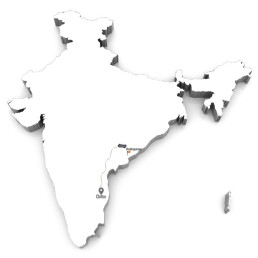
Jnana Yajna 105

Year & Dates:
June 25, 1962 to July 11, 1962

Yajna Topic:
Shrimad Bhagavad Gita- Chapter 3 & Atmabodh

Place:
Vishakhapatanam, India
A city with panoramic beaches, vibrant culture, and the oldest shipyard in India, Visakhapatnam gained the distinction of being the 105th milestone in the journey of the first 108 Jnana Yajnas performed by Pujya Gurudev.
Arriving there by the Calcutta Mail train after a brief stopover in Chennai, Pujya Gurudev was welcomed profusely both in Telugu and Sanskrit by the Visakhapatnam Gita Jnana Yajna Committee. Sri A. Suryanarayana Rao, the secretary of the yajna committee had the privilege of unfurling the OM flag, and Dr. Swami Jnanananda. Professor of Nuclear Physics, Andhra University, felt honored to inaugurate the 105th Jnana Yajna, especially in his hometown for the first time.
Pujya Gurudev started with the importance of living a spiritual life: “We know the laws of electrical energy. By mere knowledge of it, we cannot gain comforts out of it. We must implicitly obey the law, and make use of it. So it is with the Science of life, the philosophy. Mere knowing the laws of life is not enough; obeying it is unavoidable.”
Right Contact through the Highest Source
The 105th Jnana Yajna was a veritable treat with two brilliant expositions of Vedantic philosophy – Bhagavad Gita’s crowning Chapter 3, and Atmabodh, an introductory text of Vedanta – ‘a poetic garland’ of thoughtful similes, penned by Sri Adi Shankaracharya.
Pujya Gurudev highlighted the great contribution of the incomparable Veda Vyasa who revived the vanishing treasures of the Vedas at a crucial time and presented the Truth in various formats from the compiled Vedas to Puranas and also the itihasa of the voluminous Mahabharata. He spoke about the immortal role of Shrimad Bhagavad Gita which shines in Vyasa’s Mahabharata:
“In the Gita, we find how the great ideas and ideals discussed in the Upanishads can be practically applied in daily life. This textbook interprets the idealism of the Upanishads as a practical philosophy. It clearly shows the way to clear the jungle of our existence for the garden of peace and tranquility to be built up. It stands between the idealism of the Upanishads, discovered by the scientists of life, the Rishis, and our everyday life in the marketplace, factories and offices where we are forced to grapple with problems.
Gita seems to be an ‘Exchange House’ wherein we find Krishna, the great teacher, bridging, in a beautiful way, the two extremes and giving out to us the technique of the correct way of contacting the world.”
Pujya Gurudev urged the audience to imbibe and implement the techniques advised in the Gita. He also reinforced, through the verses of Atmabodh, the glory of Knowledge concluding, “Whether the sea is stormy or calm, the Sun always shines on it. Similarly the Pure Atman, the Truth which is behind time, space and causality, which is All-pervading, which has no duality, which is the Pure Consciousness in all awareness, which is the substratum on which all this pluralistic things play about, that is the One Consciousness which illumines the entire creation. Without It, nothing will exist anywhere. Know that to be your own Self.”
A Meditation Minute:
ये गुणाः सर्वशास्त्रेषु वर्ण्यन्ते ब्रह्मज्ञानिनाम् । तैरयं सर्वदा पूर्णो राजते सर्वयोगिनाम् ॥८॥
ye guṇāḥ sarvaśāstreṣu varṇyante brahmajñāninām । tairayaṃ sarvadā pūrṇo rājate sarvayoginām ॥8॥
- fully endowed with the virtues of knowers of Brahman as described in all scriptures, he ever shines among all yogis.
We stand illumined by the virtuous brilliance of our Pujya Gurudev who was a Srotriya – well-versed in all scriptures, and Brahmanishta – ever established in the Absolute Truth. In every yajna, He appealed to the people to live by what the scriptures taught, to convert learned values into lived virtues. That was the bedrock He envisioned for Chinmaya Mission.
Photo Gallery
The General Secretary, Mr., Suryanarayan Rao, whose enthusiasm and tireless effort brought Gurudev to Vishakhapatnam for this Jnana Yagna!
A Suryanarayan Rao, "Salt King" Waltair, General Secretary, addressing the Crowd nut for his enthusiasm and sacrifice 105th Yajna would not have taken place in Vishakhapatnam

“Think,” Says Pujya Gurudev
The very word Yoga, which perhaps frightened away the ordinary man by the time of the Puranic Age, is used here so liberally that we have got in the Geeta something like eight or ten different types of Yogas advised: Bhakti Yoga, Buddhi Yoga, Anasakti Yoga etc., besides Karma Yoga and Jnana Yoga. And even Yoga has been described as ‘dexterity in action’. This is, as it should be, because at certain periods of history a generation comes to entertain a sentimental dread along with an intellectual aversion for the best in their own culture and, at all such moments, a revival can take place only when this idle fear has been removed from the mind of the populace. And the easiest method of its removal is by bringing down the awe-inspiring words to cheaper usages without spoiling the glow and fire of its pristine usage.
A child, who is frightened of the domesticated cat soon grows to be a young cat-tyrant in the house, when the child slowly gets familiarized with the animal. Similarly, the Vedic technique of self perfection, which had become empty and hollow and even frightening to the Hindus of that period, through the Bhagawad Geeta, Vyasa familiarized them with the tamer implication of the terms.
From Tyagi Magazine
Because they lack in their powers of right discrimination, the qualities of the body-mind-intellect, the limitations of the physical and subtle body are super imposed by the ignorant on the Pure Self. Thereafter the deluded mistake this Real Self to be One processing all the imperfections of the superimposed equipment. This non-discrimination (Aviveka) is like the misconception which makes children believe that the sky is blue when actually it has no color.
Not only the blueness but the concavity of the sky, murkiness, misty looks, dusty conditions, are all often considered as conditions of the sky. In fact, space appears as having these qualities but space as such has none of them.
An object is not affected by the traits superimposed upon it, and here, when we superimpose certain characteristics of the body and mind on the Self-effulgent Being, the Truth itself is not affected by such misconceived notions and attributes.
From Atmabodh Book
Cause of our Suffering!
Pujya Gurudev Swami Chinmayananda elucidates how the Supreme expresses as perceiver, feeler, and thinker through the sense organs, mind, and intellect respectively. He compares the diversity of human bodies to the varied structures built from the same five elements, highlighting how individual experiences of joy and sorrow are shaped by past actions, reflected in the blueprint of one’s body.
Jnana Yajna 104
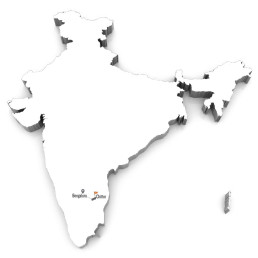
Jnana Yajna 104

Year & Dates:
May 23, 1962 to June 12, 1962

Yajna Topic:
Shrimad Bhagavad Gita- Chapter 3

Place:
Chittor, India
“We believe that the only way to inaugurate Swamiji’s second Yajna at Chittoor would be through the remembrance and recollection of the knowledge given to us by Swamiji during the first Yajna. We only have a few words of welcome to say but really, Swamiji, how are we to welcome one like you? You are free as the wind that moves unfettered over hills and dales, plains and plateaus. You have the flight of an eagle that soars upon light wings into regions ethereal, and you come down in your kindness and love to our level only to cleanse from the face of this land the ignorance that is ours, and that collects in the Yajnashalas anticipating redemption through you. You come and go lightly and lovingly. It is only we that have broken the expanse of time into fragments, and that thereby suffer the bondage of experience; and for us alone there are welcomes and farewells.” Thus Sri V. Dwarkanath Reddy welcomed Pujya Gurudev on May 23, 1962.
All-Inspired, Harmonious Action
Aravamudam, a school-going youngster, had been attracted to the huge pandal the previous year thinking a drama was being staged. Learning that a Swami was going to speak, his friends and he were about to leave when Pujya Gurudev’s reverberating “Om” arrested his attention. He addressed Pujya Gurudev: “Respected Swamiji, your language is so simple that even students like me were able to follow you. Our understanding was made easier by your examples, jokes, and what you amusingly called your Kathakali. It is probably much easier to teach history, geography, and mathematics. To teach this science which includes the inner makeup of human beings and how to change their approach by changing their outlook, is rather difficult unless the teacher himself had perfected, by Sadhana of several years. Swamiji practices sincerely what He preaches. So, Respected Swamiji, your guidance is very essential for us in this age. You are the person who should shape our future.” It was the voice of the future that gratefully recognized the scriptural wealth that Pujya Gurudev strived to give them.
Following that, Sri. Ramnath Iyer, recalled how Pujya Gurudev had endowed Chittoor with a new vision. And, Shri Sudhakar, the district Forest Officer, acknowledged how Pujya Gurudev’s yajna had given him a goal and noble path in life.
With great affection, Pujya Gurudev began His 104th Jnana Yajna: “Our Rshis the great seekers, and Acharyas, the master technicians of life, analyzed life and probed into actions which are nothing but manifestations of life. In order to discipline life, one should strive to discipline action. Thereby a harmony is created and thus harmonious living is the great goal of life.”
Introducing the texts to be studied for that purpose at Chittoor, He added, “The third chapter of Gita and Ishavasya Upanishad are chosen because these two texts teach us, or rather guide us in situations that we are facing today. Our doubts, fears are all quelled by taking a wholesome attitude and working unceasingly throughout our lifetime without fear of prejudices.”
Pujya Gurudev’s 104th yajna, culminating in a special yatra to Tiruvannamalai, edified the path of glorious action dedicated to the Omnipresent Divinity.
A Meditation Minute:
यथा वृद्धिं प्राप्नुवन्ति तथा यत्नं करोति सः । सर्वदा सर्वभावेन सद्गुरुर्नो यतीश्वरः ॥७॥
yathā vṛddhiṃ prāpnuvanti tathā yatnaṃ karoti saḥ । sarvadā sarvabhāvena sadgururno yatīśvaraḥ ॥7॥
- As these will grow, so does our Sadguru – the Lord of ascetics – put for effort consistently and whole-heartedly.
We salute most respectfully, our Pujya Gurudev, whose life was an unbroken penance. Carrying the teachings of His Guru, Swami Tapovanam, Pujya Gurudev Himself was a moving forest of Tapas, redefining the realm of actions as selfless yajnas. That was His vision for Chinmaya Mission – for actions, noble and uplifting, to finally be sublimated in Pure Knowledge.

“Think,” Says Pujya Gurudev
The purification of the motives is possible only when the mind is made to constantly sing the Divine Songs praising the glories of the Self. In the song of Truth the heart begins to throb with the highest Divine impulses. Actions performed in the outer world by such an individual are no more than ordinary actions but they become expressions of the Supreme Will through that individual. When the limited ego is replaced by the constant feeling of the Lord as “I am the Supreme” such an individual becomes the most efficient instrument for the expression of the Divine Will.
Not only is it sufficient that we renounce thus all wrong actions, but we have to make a few adjustments in our inner instrument in order to bring out an unobstructive flow of the Creator’s Will through us. They are indicated here by the two terms “without hopes” and “without ego.”
From Tyagi Magazine
How to control sense organs?
In the captivating teachings of Pujya Gurudev Swami Chinmayananda, he unveils the profound truth: when desire eclipses understanding, even the wisest falter. Like a raging forest fire, desire engulfs the senses, mind, and intellect, undermining inner harmony. He urges us to master the senses first, for they guard the treasury of our hard-earned wisdom.
Jnana Yajna 103
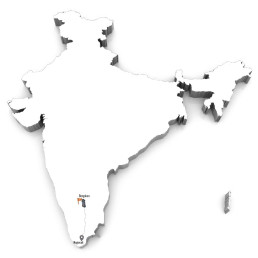
Jnana Yajna 103

Year & Dates:
April 23, 1962 to May 22, 1962

Yajna Topic:
Shrimad Bhagavad Gita- Chapter 17

Place:
Bengaluru, India
Bengaluru always ran into a pleasant quandary whenever Pujya Gurudev’s Jnana Yajnas were hosted. No matter how big the yajnashala enclosure, the crowds exceeded its capacity! So, as soon as Pujya Gurudev decided to conduct His 103rd Jnana Yajna in Bengaluru, a high-powered yajna committee was formed. Prominent businessmen and retired officials of the Karnataka government began planning. They were ably supported by an enthusiastic member body of the Chinmaya Mission (CM) branch in Bengaluru.To fund the various expenses related to that tenth yajna in the city, the different Study Groups reached out to patrons and donors.
After careful consideration, the humongous playgrounds of the Corporation High School at the Shivajinagar location in the city was chosen, and the largest Pandal thus far in the city arose. Surrounding it were the book stalls and the special CM counter. Flowers, bright streamers, and sparkling strings of colorful lights adorned the yajnashala that shone with great anticipation.
The Lamp of Love and Renunciation
Showing no signs of His travel fatigue and an aching back, Pujya Gurudev marched into the already-bustling yajnashala at precisely 6:30 pm on the evening of April 23, 1962. The Purna Kumbha reception amid the Vedic chants before the Om flag hoisting by Sri. S. M. Ramakrishna Rao, the president of the yajna committee, was apt and auspicious. Two proud rows of Balavihar children, chanting the Mahamantra and beautifying Pujya Gurudev’s path to stage with flowers, presented an endearing scene. And, Pujya Gurudev inaugurated the Jnana yajna with His three sonorous utterances of “Om” and a gripping introduction of the climactic chapter 17 of the Gita. He also gave the context of the Taittiriya Upanishad that would be the subject of His morning sessions.
Through Detachment (Tyaga) to “Renunciation” reiterated Pujya Gurudev as He explained Chapter 17: “Sanyasa means sacrifice, and to live in a spirit of sacrifice after renouncing completely one’s ego and its desires is true Sanyasa, wherein an individual comes to live in constant awareness of his fuller and ampler Divinity. Sanyasa is not running away from life or coloring the cloth. Hinduism considers him to be a Sanyasin who has learnt the art of living his life in constant inspiration which is gained through an intelligent renunciation of his ego-centric misconception.”
The audience multiplied as predicted, braving the rains, to sit at the Master’s Feet breathing in His dynamism and mesmerized by the way He summarized the entire Gita through His impassioned explanation, verse by verse. They were moved when He battled his own fever-ridden body to return to the stage after minimal rest for a day. He even accompanied them on a day’s yatra to the holy temple of Subramanya on May 15th.
Pujya Gurudev set aside time during the yajna to showcase the children of the many Bala Vihars in Bengaluru. The children came onstage to enchant all with their sweet and clear chanting of the Gita, Vishnu Sahasranama, and other stotras. Their stories and bhajans filled the audience with joy and devotion. Pujya Gurudev encouraged the budding talents with prizes and the invaluable, fatherly love of a Guru.
A Meditation Minute:
बालकेषु च संस्कारो विचारो युवकेषु च । धर्मनिष्ठा देशभक्तिः लोकसेवा तथैव च ॥६॥
bālakeṣu ca saṃskāro vicāro yuvakeṣu ca । dharmaniṣṭhā deśabhaktiḥ lokasevā tathaiva ca ॥6॥
- Noble saṃskāra among children and right thinking among youth and so also firm abidance in one’s duties, patriotism and service of people.
We surrender with adoration and reverence to our Pujya Gurudev who brightened the hearts of millions of children with His immeasurable love. His unbridled joy and laughter with the most innocent young, His straightforward nobility that captured the attention of the youth, and His resolute seva to Bhaarata and the people worldwide is the happiest legacy of Chinmaya Mission.
Photo Gallery

“Think,” Says Pujya Gurudev
To the extent we identify with him to that extent His light and power comes to be ours which is called His grace (Prasad). Ere long a result of this accumulated “grace” brought within, through the integration of the personality and a constant surrender of the ego, the individual shall obtain “the Supreme peace, the eternal resting place”.
With one’s all being (Sarvabhavena) : This surrender unto the Lord should not be a temporary self-deception. We must grow into a consciousness of the presence of the divine in all the planes of our existence. To illustrate such an all-out devotion, we have the examples of Radha, Hanuman, Prahlaada and others. Without bringing all the levels of our being and all the facets of our personality into our love for Him, we cannot drown our finite ego-sense into the joyous lap of the Infinite Lord. Thus, a true devotee must change the entire orientation of his being, and most surrender himself as a willing vehicle for His expressions. Then and alone, all the delusions end and the mortal gains the experience and lives the State of Immortality the Godhood.
From Tyagi Magazine
Question:- Your Holiness never tells us anything about your life at Uttarkasi where you had been for more than ten years. This will surely inspire at least write about it in the Usha; it will benefit all of us.
By old association, too sacred for words, Uttarkashi life is a theme I cannot speak on or write about. I still find in it a leisurely charm against which all my hurried dashes from place to place, breathless talking, hurried achievements, busy success- all look like a morbid fever of an imprisoned heart. I thus suffer but I am happy too that I suffer! This walkie-talkie phase of my life is full of thrills of sobs, sweet with disappointments and bitter with satisfactions.
Question:- Can we practice Karma Yoga while living our-every-day life? Then why is it called Yoga? What is Karma Yoga please
While walking the rugged grandeur of our every-day-life, let us live the flaming joy of His Peace in our hearts. Surrender to Him in devotion, and work. This is karma Yoga.
Remember this, before you donate!
What intricate dynamics underlie charity, transitioning from selfless Sattvic giving to reluctant Rajasic acts and misguided Tamasic gestures? How can one unlock the transformative potential by aligning actions with higher ideals, paving the way for deeper altruistic fulfillment and personal growth?
Watch video and learn.
Jnana Yajna 102
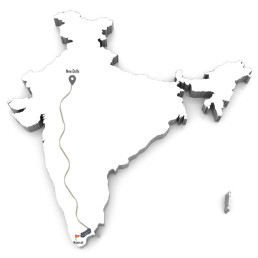
Jnana Yajna 102

Year & Dates:
April 01, 1962 to April 20, 1962

Yajna Topic:
Shrimad Bhagavad Gita- Chapter 2

Place:
Nagercoil, India
Nagercoil, scenic and close to the Arabian Sea at southern tip of India, has a special charm because of the surrounding Western Ghats and the fragrance of its clove and cardamom fields. It is also home to the ancient Nagaraja (the Lord of serpents) temple with an architecture that shows the influence of Jainism.
Called the “Gateway to Kanyakumari,” the city became an energized portal for Pujya Gurudev’s 102nd Jnana Yajna for 21 days from April 4th. It was Nagercoil’s first Jnana Yajna, and the president of the yajna committee, Sri Venkateswara Iyer, and Sri R. Vaidhyanathan, the general secretary along with a sincere team of aspirants spared no efforts in preparing the yajnashala to accommodate the eager crowds and provide an ambience of serene spirituality.
The topic that was chosen was the core philosophy of the Gita, the Sankhya Yoga of chapter 2. In His morning classes, Pujya Gurudev planned to expose the audience of Nagercoil to the beauty of Vedanta through Adi Sankara’s Atma Bodha.
A Wondrous Embodiment of Perfection
In that first momentous decade of Chinmaya Mission, the way that Pujya Gurudev traversed the length and breadth of the country and stirred up a distinct, disciplined movement of spiritual reawakening is stunning in retrospect. He moved swiftly and purposefully. After the Jnana Yajna in the glamorous capital city of Delhi, He flew to Mumbai to supervise the work in Sandeepany Sadhanalaya. Then He flew to Cochin, stopped at Ernakulam to visit and cheer Kochu Narayani Amma, His mother, before hastening to Thiruvananthapuram to reach Nagercoil by car. The miles and destinations seemed to have no impact on Pujya Gurudev, still a thing of utmost wonder for His devotees.
Nagercoil bowed and remained spellbound as Pujya Gurudev systematically introduced seekers to the fundamentals of Vedanta and guided them to epitome – the second chapter that gives a superb synthesis of all the paths, Jnana, Karma, and Bhakti to suit the temperaments of all seekers. The audience were also captivated by the beautiful blend of poetry and plain practicality in His discourses. The way He took the Highest ideals and exhaustively explained how to incorporate them in everyday life was the biggest reason for His yajnashalas to overflow with the intrigued, the interested, or the ignorant.
When Pujya Gurudev walked among the crowds on the last day of the yajna sprinkling the sacred waters of the Ganga, the awed Nagercoil audience glimpsed that He was a realized Master who showed how the Sthithaprajna lakshana, the marks of a Perfected Being, can be achieved while walking among crowds and still transcend everything. Like so many thousands, they considered that yajna an unforgettable part of their lives. They offered with great love and gratitude a small donation to support Sandeepany Sadhanalaya, moved by how Pujya Gurudev blessed them not just with the greatest wisdom of the Gita but also the yajna prasad booklets that became most precious keepsakes in their spiritual journeys.
A Meditation Minute:
ज्ञानयज्ञप्रचारं च ब्रह्मचारिप्रशिक्षणम् । श्रुतिस्मृतिपुराणादिव्याख्याग्रन्थप्रकाशनम् ॥५॥
jñānayajñapracāraṃ ca brahmacāripraśikṣaṇam । śrutismṛtipurāṇādivyākhyāgranthaprakāśanam ॥5॥
- Propagation of the jñāna-yajñas, training of the brahmacāris, publication of the commentaries on Upaniṣads, (Bhagavad) Gītā, Purāṇa and other books.
We prostrate in all humility before the dynamic Pujya Gurudev who carried the torch of Knowledge Absolute, yajna after yajna from December 1951 to July 1993. His incredible foresight in creating the Chinmaya Guru Parampara through hundreds of brahmacharins, and His prolific commentaries on the Prasthana Trayi forever keep Him close and central in our spiritual pursuits.
Photo Gallery

“Think,” Says Pujya Gurudev
In the confession ‘that I am thy disciple’ there are volumes of suggestions summarized. The relationship between the teacher and the taught in India is unique. The student of course has an attitude of total surrender of his master, whom he had tested and found fit for total reverence as nothing short of a living and speaking God for him. The teacher also, having accepted a disciple, considers it his duty to guide the boy always with kindness, love and affection, a thousand times more than any father could ever feel for his own son. If the student is expected to follow faithfully every bit of instructions given out by the teacher, the teacher has also the responsibility of removing all the doubts of the student, even for a hundredth time, if need be.
From Tyagi Magazine
Powerful Message for Teenagers!
Yielding blindly to the demands of the senses without exercising control over them is akin to allowing a ship to drift aimlessly at sea, subject to the whims of the wind. Without direction from the intellect, one’s life becomes scattered and devoid of purpose, leading to a state of agitation and lack of contemplative power. Ultimately, this lack of control over the senses results in a life devoid of both worldly success and inner peace, resembling a ship without a captain, destined to be lost in the tumultuous seas of existence. Watch video for Pujya Gurudev Swami Chinmayananda’s inimitable explanation.
Jnana Yajna 101
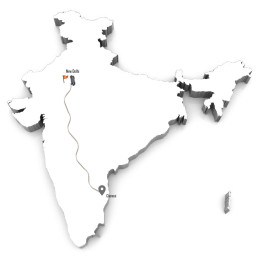
Jnana Yajna 101

Year & Dates:
March 05, 1962 to March 26, 1962

Yajna Topic:
Shrimad Bhagavad Gita- Chapter 18

Place:
New Delhi, India
As if deaf to the praise and applause for His Centenary Jnana Yajna, Pujya Gurudev went into meditative Silence on the auspicious Mahasivarathri day of March 4 during the spiritual retreat at Kakular near Chennai. Then, He boarded the Calcutta Mail to Vishakapatanam and talked about Life before He boarded the flight to Delhi to reach there for His 101st yajna.
Ever on the move, always in the vital present, He looked up at another Om flag going up to signal another yajna on the evening of March 10, 1962 at New Delhi.
The yajnashala was constructed tastefully in an area of around 27,000 square feet with 12,000 sq. feet under a bright shamania. Located centrally on Parliament Street close to Connaught Place, it attracted huge, enthusiastic crowds – for the faithful followers in Delhi, it was a much-anticipated jnana yajna, and the excitement was palpable.
Sanctifying Study, Surrender, and Action
The Chief Justice of India, Sri B.P. Sinha, presiding over the inaugural ceremony of the yajna expressed the collective gratitude of Delhi for Pujya Gurudev’s monumental efforts and said: “The Gita, apart from a being a religious scripture of the Hindus, embodies the philosophy of universal truth that a thing well-done is its own reward, and the ordinary human being can do no better than discharge their own assigned duties to the best of their abilities.” He pointed out to the message of Gita echoed in Longfellow’s poetic lines:
“…Act, Act in the Living Present!
Heart within, and God o’er Head!”
Pujya Gurudev had chosen to teach chapter 18, the summative finale of Srimad Bhagavad Gita, during His evening discourses from 6:15 pm to 7:45 pm. For more intensive study in the mornings from March 12th, from 8 am to 9:15 am, He decided to enlighten the serious seekers on the sublimity of Sri Vidyaranya’s Panchadasi chapter 10, the Natakadipa Prakarana.
A special souvenir was released to mark the occasion and donate the funds raised from the advertisements to the Tara Cultural Trust overseeing the upcoming Sandeepany Sadhanalaya. In that souvenir, a chief patron of the 101st yajna, Sri. Rajendra Prasad, the President of India wrote: “I send my good wishes to Sri Chinmaya Gita Jnana Yajna with whose activities I am somewhat familiar. I wish success to this organization which aims at making people conscious of spiritual, moral, and religious values in life.”
Pujya Gurudev, with His scintillating exposition on Moksha Sannyasa Yoga of chapter 18, made clear the difference between sannyasa and tyaga. Echoing the Upadesha (advice) that Bhagavan Krishna gave to Arjuna, the surrendered seeker, He emphasized how to divinize various aspects such as Shraddha (faith), dana (charity), dhriti (fortitude) and more while clarifying about the aspects and type of duties to never forsake. He also exhaustively described the play of the gunas in life, holding a mirror to our delusions in life.
Pujya Gurudev carried seekers of all backgrounds and nationalities in Delhi to the heights of Vedanta, both through the Gita and Panchadasi guiding all to “know” Who is the Supreme Illuminator and what to do with whatever is given in life. The audience were left recalling again and again the indescribable glory of His words and Presence throughout the 101st Jnana Yajna.
A Meditation Minute:
स्वयं कुर्वन् कारयंश्च कर्माणि विविधानि यः । असक्तः सर्वकार्येषु वर्तते सर्वदा च सः ॥४॥
svayaṃ kurvan kārayaṃśca karmāṇi vividhāni yaḥ । asaktaḥ sarvakāryeṣu vartate sarvadā ca saḥ ॥4॥
- Himself doing and inspiring others to do various projects, he ever remains unattached in all of them.
We are deeply inspired by Pujya Gurudev’s supreme efficiency and dispassionate, detached excellence in His every action. A fascinating, inspiring conductor of the symphony of increasing activities and spreading centers of Chinmaya Mission, He truly personifies the beauty of doing without desire, independent of results, ever established in the Highest.
Photo Gallery

“Think,” Says Pujya Gurudev
In a Yajna, Lord Fire is involved in the sacrificial altar, and into it are offered oblations by the devotees. From this analogy the term Jnana Yajna has been originally coined and used in the Geeta. Study of the Scriptures and regular contemplation upon their deep significance kindle the “Fire of knowledge” in us and into this the intelligent seeker offers, as his oblation, his own false values and negative tendencies. This is the significance of the metaphorical phrase Jnana Yajna. The Lord, therefore, admits but a truth in the Spiritual Science when He declares that those who study the Geeta-contemplate upon its meaning, understand it thoroughly and those who can, at the altars of their well kindled understanding, sacrifice their own egocentric misconceptions about themselves and the world around them are, certainly the greatest devotee of the Infinite.
From Tyagi Magazine
Do not Compromise!
The essence of the video lies in living life with conviction and purpose, regardless of circumstances, even in the face of death or adversity. By adhering to one’s beliefs and principles, individuals can find joy and fulfillment, contributing positively to society and leaving a lasting impact, as exemplified by historical figures like Christ and the transformative power of personal conviction.
Jnana Yajna 100
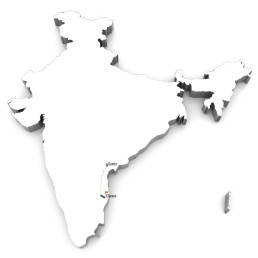
Jnana Yajna 100

Year & Dates:
February 01, 1962 to March 02, 1962

Yajna Topic:
Shrimad Bhagavad Gita- Chapter 7, 8 & 9

Place:
Chennai (Madras), India
“About nine years ago from Uttarkashi in the Himalayas, this Flow of Wisdom rushed down throughout the Bharath Varsha, sanctifying it, glorifying it, thus marking the beginning of a cultural revival in thIs great land,” remarked Smt. Radha Thyagarajan, with reverence and gratitude, in her inaugural address of Pujya Gurudev’s Centenary Jnana Yajna at the Mount Road yajnashala.
The carefully festooned and decorated pandal was in a heightened state of bliss after Pujya Gurudev was welcomed traditionally by Sri. M. Pethachi, the president of Chinmaya Mission, Madras. The saffron Om flag showered Pujya Gurudev with flower petals when Smt. Madhuram Rayaningar, the secretary of the yajna committee, hoisted it.
And, with majestic Grace, as two rows of bright children marked His path with loving respect and more flower petals, Pujya Gurudev ascended the stage. A melodious invocation by Smt. M. L. Vasantakumari, a stalwart of Carnatic music, moved all, and Mrs. Kothari, the president of the Madras yajna committee, extended a warm welcome to Pujya Gurudev and the surging audience.
Spirituality, Hundredfold and Pure
“A lot of talk has been heard about the 100th yajna. It is a sheer accident that this is the 100th session of the talking of Swamiji. The 100th yagna is great only when it is connected with desire prompted motives for gaining heaven etc. But when it is done as a nishkama karma and when it is only a jnana yajna, the 100th yajna is neither less nor more significant than the first yagna.” Pujya Gurudev’s opening discourse on the inaugural day of the Centenary Jnana Yajna at Chennai was powerfully indicative of how outward achievements did not sway Him.
Diving into the heart of that jnana yajna, He prefaced: “We will not be discussing what the world outside is. We will not be discussing the world of objects – body, mind, or intellect. We shall be discussing of That because of which the eyes are able to see, but the eyes themselves cannot see, of That because of which the ears hear; that Spiritual entity, the final Truth alone, will be the theme of discussion here for this one month during this hundredth yajna.”
As He prepared the audience for deep thinking, Pujya Gurudev, with deft and eloquent brevity, sketched the outline of the first third of the Gita: “In the first chapter we see the hysterical Arjuna. The second chapter, the contents of the entire Geeta. The 3rd chapter gave us the Path of Action. The 4th and 5th explained as to how from, the path of action we are to slowly withdraw and meditate upon the Highest, The 6th explained to us the technique of meditation. In logical development, He had explained to Arjuna in 7th, 8th and 9th what exactly is the highest Ideal upon which he must meditate and reach. The destination or the goal has been discussed and described very clearly and scientifically. This is the theme we will be taking here.”
The mornings of that enriching month of Yajna was devoted to Pujya Gurudev’s analysis of Shree Vidyaranya Panchadashi Chapter 14, the Vidyananda Prakarana. Open only to serious sadhaka members, that chapter which detailed the bliss of a realized Brahmavid quoting almost all major Upanishads, revealed Pujya Gurudev’s Vedantic depths.
The spiritually eminent Centenary Jnana Yajna was a grateful offering born of deep surrender to a beloved Guru, organized by an inspired all-women yajna committee.
A Meditation Minute:
निष्क्रिया करुणा क्वापि सफला न भविष्यति । इति मत्वा सर्वदैव कर्मणि वर्तते यतिः ॥३॥
niṣkriyā karuṇā kvāpi saphalā na bhaviṣyati । iti matvā sarvadaiva karmaṇi vartate yatiḥ ॥3॥
- Knowing fully well that nowhere does passive compassion serve any purpose, he always remains engaged in Karma.
We prostrate at the Lotus Feet of Pujya Gurudev, awed by how He embodied the path of active spiritual evolution, ‘working’ even though He was beyond the field of actions. His clarion call to aggressive goodness, untiring seva, and selfless unfoldment continues resounding and redirecting seekers everywhere.
Photo Gallery

“Think,” Says Pujya Gurudev
To the Jnaani “Supremely dear am I.” Love is measured by the amount of identification the lover has gained with the beloved. Self-surrender is the tune in which the song of love is truly sung. Selflessness is the key in which the duet of love is played. Love demands “giving without expecting any return,” at all times, in all circumstances. With this understanding of the nature of true selfless-love, when one tries to understand the attitude of the Gyani towards the Self, it is but true to say that, indeed, a Gyani alone knows how to love so well and so thoroughly.
From Tyagi Magazine
Each teacher comes and marks out on the black-board different designs which represent the design of knowledge that each teacher has in his bosom. But all of them were chalked out and executed on the same changeless black-board, which illumines the mathematical calculations, the geographical data, the chemical formulae, and the historical facts, in turn.
Similarly, the changing world of the unmanifested must all have one Changeless Substratum “that which is not destroyed by the destruction of all beings”. When in the evening the students and teachers have left the classroom the black-board still remains. This principle of Pure-Consciousness, Itself unmanifest-inasmuch as it is not perceivable by the sense-organs or comprehensible by the mind and intellect is indicated here when Lord declares “beyond this unmanifested, there is the other Eternal Existence, the Unmanifest”.
From Tyagi Magazine
Be it “a leaf, a flower, a fruit, or water,” it is insignificant what you offer: be it a golden temple, or be it a dry leaf, “whosoever with devotion offers” whatever be the offering, the Lord of Brindavan assures “that I accept”. For, when lovingly given it becomes “a devout gift” and when it is offered by a sincere “pure minded” student, the Lord has to accept it.
From Tyagi Magazine
Can Women study Scriptures?
The debate over whether women can engage with the teachings of the Upanishads and the Gita is unfounded, as there is no restriction on women studying these scriptures, with many Upanishads being transmitted by men to women historically. In fact, the scriptures themselves are often personified as feminine, emphasizing the crucial role of women in preserving and transmitting cultural knowledge.
Jnana Yajna 99
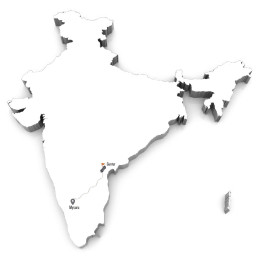
Jnana Yajna 99

Year & Dates:
January 09, 1962 to January 30, 1962

Yajna Topic:
Shrimad Bhagavad Gita- Chapter 12

Place:
Guntur, India
A city in the lowland plains of the Krishna river delta in Andhra Pradesh, Guntur, dubbed the “land of chillies” looked forward to the sweet taste of devotion when Pujya Gurudev accepted its invitation to hold His 99th Jnana Yajna there. What was especially sweet was that it was the first yajna of Pujya Gurudev’s at Guntur.
Welcomed on the evening of January 9, 1962, with the Purna Kumbha and the vibrant, auspicious notes of the Mangala Vaadya, Pujya Gurudev witnessed the ‘Om’ flag ride up high on the post. Sri Eka Anjaneyulu, the President of the Yagna Committee, hoisted it and signaled the beginning of that Jnana Yajna in the happily populated quadrangle of the local women’s college. As the fluttering flag galvanized the atmosphere, Sri. P. H. Vittal Rao welcomed Pujya Gurudev and Dr. Narayana, the Vice Chancellor of Andhra University on behalf of the yajna committee and the lively people of Guntur.
With Faith and Great Kindness
Addressing Pujya Gurudev with great regard, Sri Eka Anjenyulu eulogized: “Your appreciation of religion as a scientific arrangement of higher thoughts of the soul and of life, has reawakened and rekindled the hope of humanity in the pursuit of Truth and Knowledge. Our ancient religion, though embedded in the heart of every living soul, has however lost its significance and effectiveness through the artificial superimposition of superstition, and its meaning is lost in the desert sands of blind and crazy belief. Your mission has unshackled religion from the yoke of orthodoxy. You are the seer and sage, the preceptor and preacher, the philosopher and prophet, and your mission to impart wisdom to mankind is the noblest service. You nobly emulate the divine path shown by the great Shankara, who preached the message of God through the length and breadth of Bharat.”
Inaugurating the Yagna, Dr. Narayana gave an introductory outline of the importance of Srimad Bhagavad Gita and its structure. He stated, “If one explores the Gita well, there is no need to study any other scripture. It is, therefore, superfluous to stress the greatness of the Gita. It consists of 18 chapters, with a total of 700 verses. It was expounded by Krishna to Arjuna. Starting with the despondency of Arjuna, the Gita concludes with the chapter, Moksha Sanyasa Yoga, Absolute Emancipation.” He pointed out how Bhagavan Krishna, through the verses of Chapter 12 – Bhakti Yoga, declared that the path of faith and devotion is the best way to reach Him.
“The quest of human intellect would find its satiation only on the lap of God, and religion is the way that takes you to that consummation,” asserted Pujya Gurudev as His 99th yajna unfolded. His morning classes on Kenopanishad were held in the Hindu College premises. Every successive day, the audience grew not just in numbers but in their Bhakti and Jnana, more faithful and full of reverent wonder about both Pujya Gurudev and the Gita.
A Meditation Minute:
संस्कृतेर्वीक्ष्य हानिं च भारतस्य च दुःस्थितिम् । द्रवितं हृस्य वदयं यन्देऽहं तं महामुनिम् ॥२॥
saṃskṛtervīkṣya hāniṃ ca bhāratasya ca duḥsthitim । dravitaṃ hṛdayaṃ yasya vande’haṃ taṃ mahāmunim ॥2॥
- I salute that great sage who’s heart melts seeing the decline in the culture and India’s sad condition.
We gratefully revere Pujya Gurudev’s kindhearted and lifelong seva to Sanatana Dharma. His selfless, multifaceted approach at a crucial juncture to revive the cultural and spiritual heritage of India soon expanded to empower both Indians and all aspirants worldwide.
Photo Gallery

“Think,” Says Pujya Gurudev
Merely to ruminate over a decorated marble symbol of the Eternal Child is not in itself sufficient food for the inner personality of man. The intellectual aspect in us is starved, although the heart nestles in satisfaction at the sofy feet of the Lord. Any over-development is but ugliness; perfection is harmony and uniform growth. Therefore, technically it is but true when Geeta advises that the devotee must bring his discriminative intellect to pierce through the stony idol to contact the pulsating Truth it represents.
“Pierce the intellect into Me”:- to contact thereby the cosmic total intellect which is Lord’s equipment.
Every one of us at any given moment is a sum-total of what we think and what we feel. If our minds are resting on the Lord and our intellect has dived into the very bowels of the Infinite our individuality ends and we merge to become one with the Infinite, the All-pervading. Therefore, the Lord says that “Thereafter thou shalt live in Me”.
From Tyagi Magazine
Three Precautions You Must Take!
Pujya Gurudev Swami Chinmayananda warns seekers of 3 precautions that we need to keep in mind when performing all our actions leading to inner alignment and spiritual upliftment.
